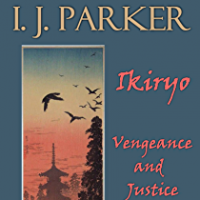The mysteries in I.J. Parker's Sugawara Akitada saga, set in the latter part of Japan's Heian Period (794-1185), are now up to 17 full-length books. Throughout, she has skillfully adopted the literary model of the traditional Asian crime novel in which the protagonist, a "righteous official," must investigate several puzzling cases. A retired professor of literature, Parker was originally drawn to the period via research.
Ikiryo: Vengeance and Justice: An Akitada Novel, by I.J. Parker.
398 pages
CREATESPACE, Fiction.
The work under review involves struggles with a vengeful spirit (ikiryo) that seems to have invaded the body of a nasty high-ranking noble named Fujiwara Tadanobu. The rational Akitada rejects that premise as superstition; but then what's really causing Tadanobu's agony?
In the second baffling case, a lovely young courtesan is accused of murdering her patron by bringing poisoned food to his jail cell. Together, the two cases underscore the importance of dispensing blind justice to both the high and low of society.
Akitada must also contend with other problems. During his prolonged absence from Kyoto, his young wife Yukiko gave birth to a daughter fathered by another man. To avoid scandal, he is reluctantly obliged to claim the child as his own. As in Parker's previous works, Akitada is supported by his crew of loyal retainers, who pool their investigative and martial skills to help their boss prevail.
Akitada might be a poetry-writing, flower-sniffing, flute-tooting Heian aristocrat, but when duty calls he can be resolute, brave and incorruptible.



















With your current subscription plan you can comment on stories. However, before writing your first comment, please create a display name in the Profile section of your subscriber account page.